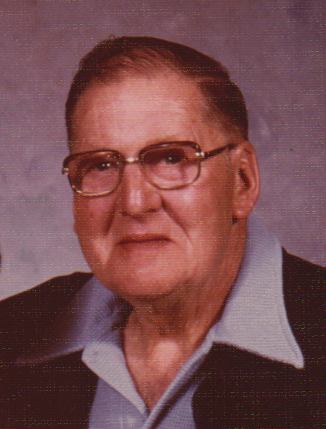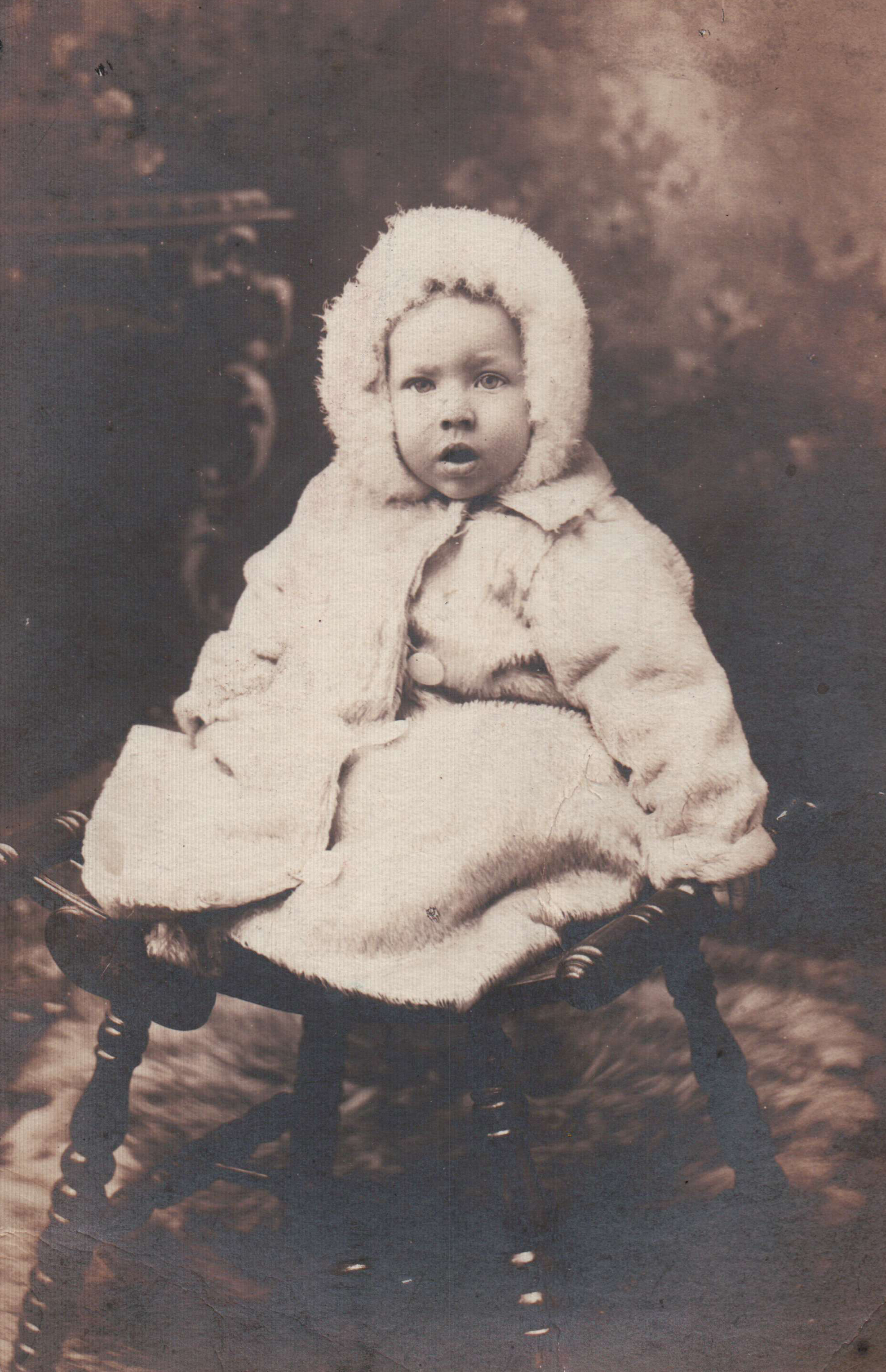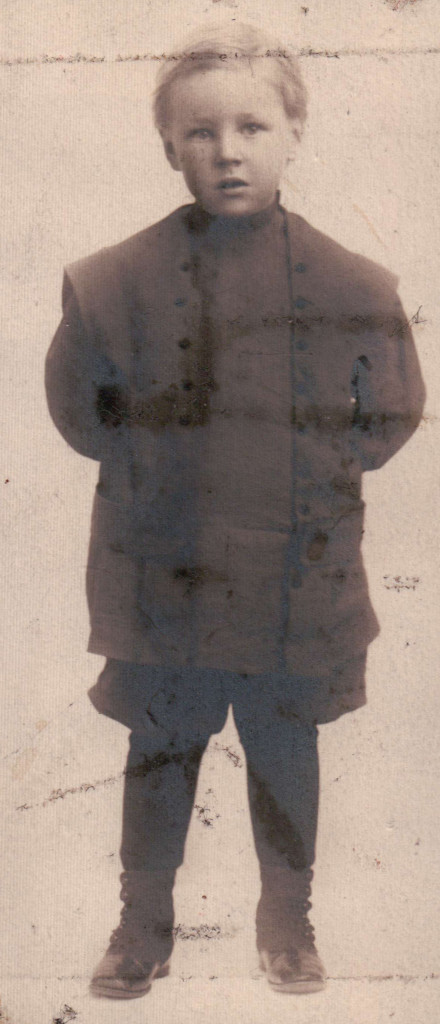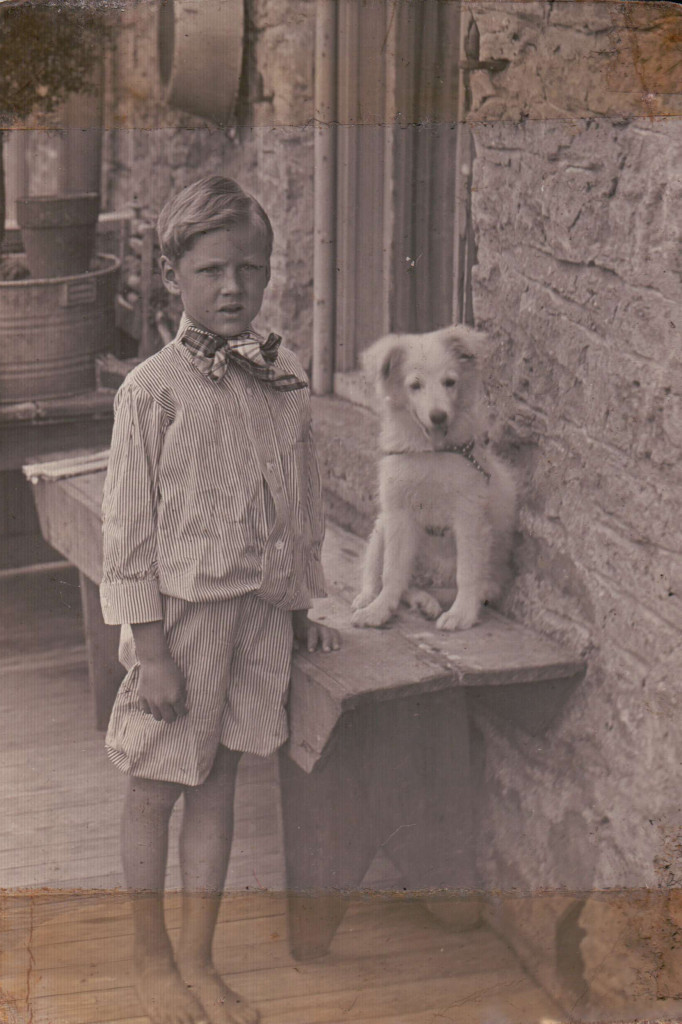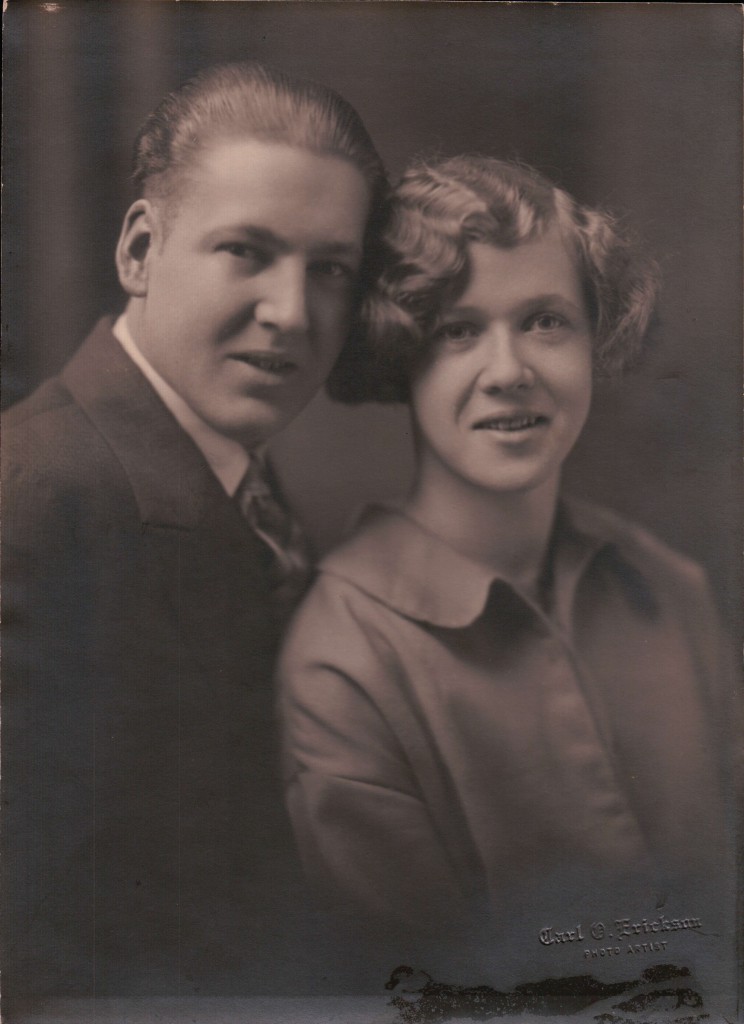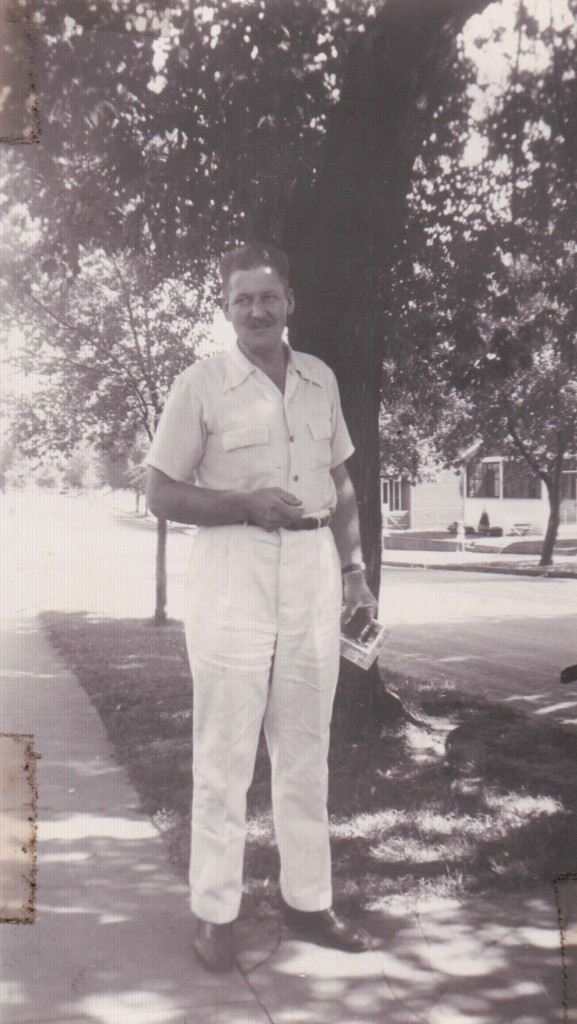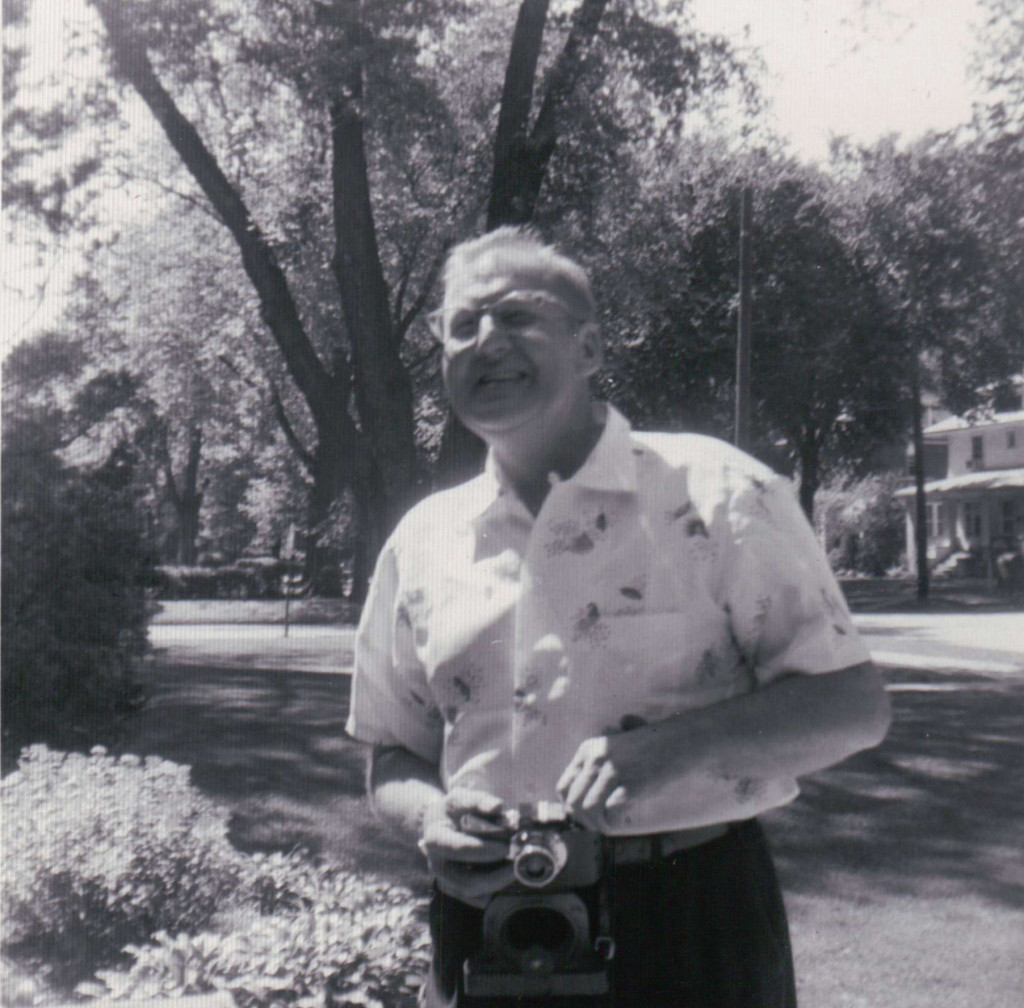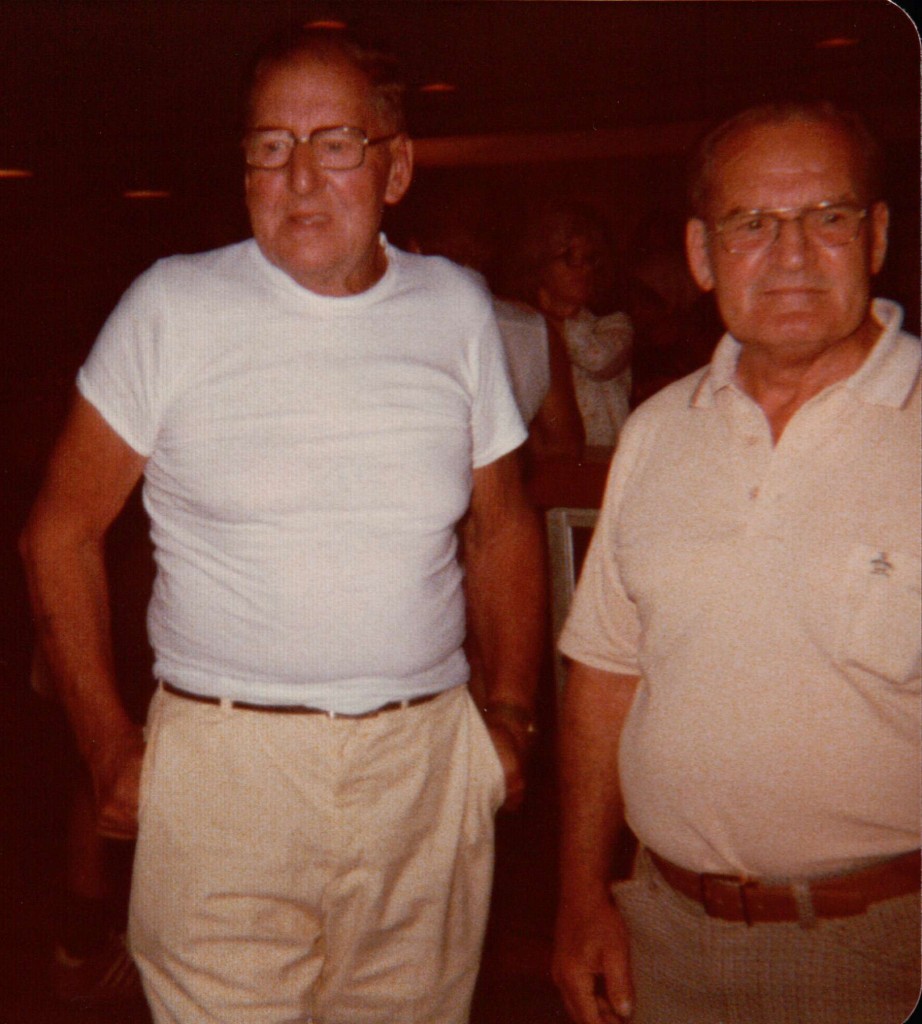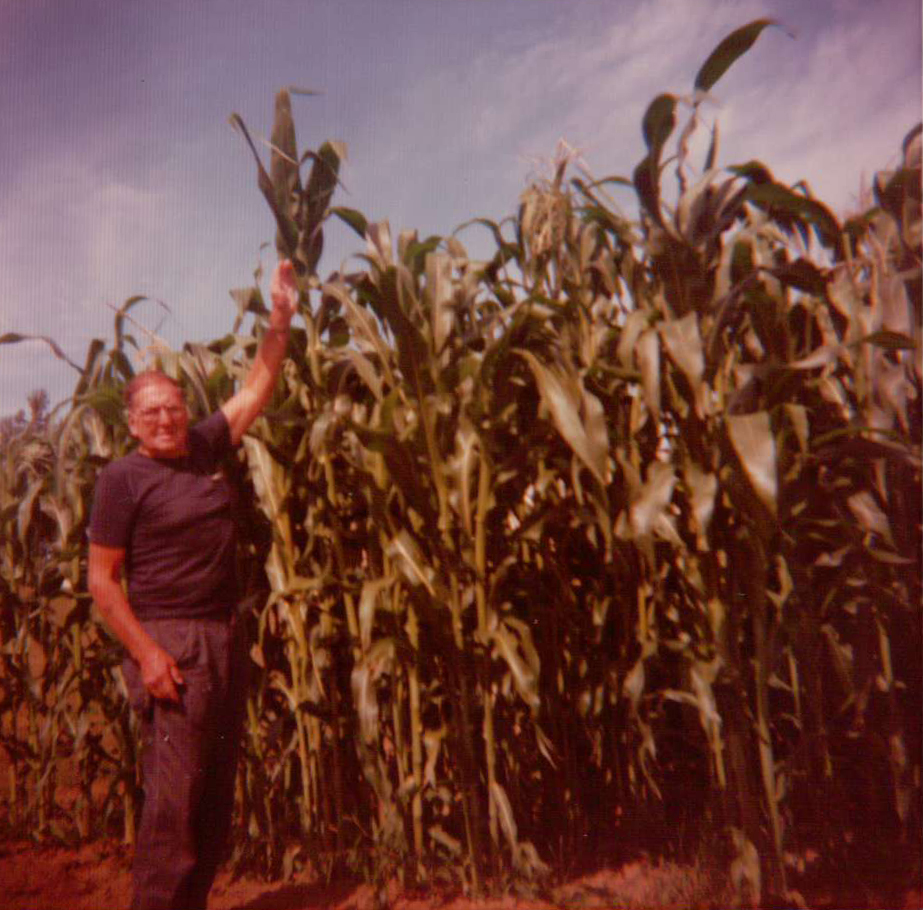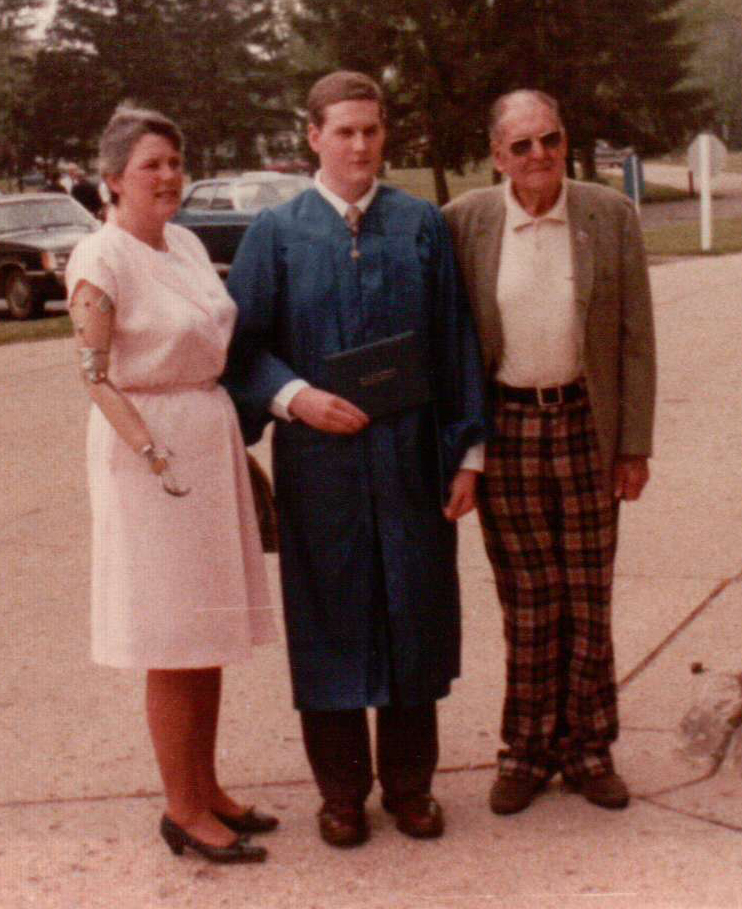My old man was an old man.
January 30, 2017 marks my dad’s 110th birthday.
My dad was sixty years old when I was born.
Sixty years.
He feared that he wouldn’t live long enough to see me graduate from high school.
It’s common for people to have their last child before they were half my dad’s age.
My dad was older than many grandparents.
I knew my dad was older than my classmates’ parents. It was normal for me, though I knew we, and I, were different.
Shortly before I was born, my dad was laid off and decided to retire. My mom, 35 years younger than dad, was teaching fourth grade and finishing graduate school, so they decided that he would stay home and be a house-husband and mom would finish school and have her career.
That meant that dad got me up and ready for school and was there waiting for me when I got home (often with something fresh out of the oven for me to “test”).
We were close. We did chores together. We tinkered in the workshop together. We cut wood together. We worked in the kitchen together. We were together all the time.
During all of that togetherness, he told me story upon story about his life and experiences. It was just normal conversation for us — but was a history lesson and perspective to which most kids aren’t exposed.
Many children with attentive parents or grandparents learn from them, but having an older parent brought with it a deeper and richer view on history. Not to mention the ability to understand many lessons learned.
My dad was a quiet, caring, thoughtful man with a big laugh who was born to a German immigrant family. He used to joke that he was “born on the boat.” He was actually born in Wisconsin.
He only spoke German and after trying to get by in school, gave up at the fourth grade.
One day, at around age 13, my dad went home to find his mom with a man who was not his dad. His mom threw a kitchen knife, stabbing my dad in the arm. He ran out of the house into the street.
Afraid to return home, and his parents in turmoil after his mom being found out, dad went to live with a nearby aunt and uncle.
But dad was restless, not in school and disconnected. He felt like no place was his own. When his aunt asked him to go to the bakery for a loaf of bread, he decided to pass the bakery and keep going. And going.
A fresh teenager, he struck out on his own, running away from whatever stood for home at the time.
It was 1920, the start of the Roaring 20s and he was a 13 year old boy out on his own. He became a hobo, riding the rails. He traveled around the Midwest and East by hitching rides on trains, taking up odd jobs in towns along the way.
He and the other men huddled around fires burning trash and found items to stay warm during the winters. They also would drink stove fuel (Sterno), for warmth, from cans discarded by the workers on the trains.
After a few years of such travel, one of the trains he was riding pulled in to Kalamazoo, Michigan. He looked out the door of the train and saw the most interesting water tower and decided that he’d stay in Kalamazoo.
That water tower belonged to the Kalamazoo Asylum — a hospital for the mentally ill. The tower, built in the late 1800s, stands today and is a unique landmark in Kalamazoo.
He eventually ended up working in the paper mill and worked his way up to management. When he “retired” he was working in a plant that made plastic cups and paper plates.
Dad worked from age 13 to 60. That’s 47 years. So not only did I grow up with a stay-at-home dad, who was born before electricity, airplanes or cars were commonplace, but one who had a lifetime of work experience to pass along.
By the time I entered the workforce I had earned a degree in business from the lessons dad taught me.
One of dad’s stories was about when they brought time-and-motion engineers into the plant. The engineers were brought in to record everyone’s work processes and to make recommendations to make them more efficient. What a joke dad thought all of it was.
The workers had to fill out cards for every task they did so that it could be tracked. Months were spent making changes in order to remove steps in the work. Management was very excited about the efficiency and savings that would result. But over time, that same management undid many of the changes that they spent a lot of money to make.
How many times I’ve seen similar situations in my working life. Big “new” ideas unleashed on the workforce, only to be abandoned for the next great idea. There’s often little follow-through and little consideration for what has already been tried. Well before the K.I.S.S. principle, dad taught me about the tendancy for people to make things more complicated than necessary and that the simplest way probably is the best.
I also learned from my dad’s many years of work experience to think about why people do things. I can’t remember how many stories he had about what people were going through, particularly during the Great Depression. Time and time again he would talk about people being difficult at work, but that they were struggling at home, trying to feed their family, trying to pay rent, supporting elderly or sick family, etc. He’d seen some really hard times personally and saw it in others and appreciated their struggles.
Another instance I remember was when we were camping and ran into a man my dad had once worked with. He was covered in scars and walked in a strange manner. I asked dad if the man had been in a car accident. Dad explained that that’s how the man came back from the war. He’d been a POW of the Nazis and they’d tortured and done “experiments” on him.
You never know what story or pain — seen or unseen — the people around you are dealing with.
Dad never lost his job during the Great Depression. Many around him lost their jobs, and unfortunately it was his job to let some of those people go. One evening in the mid-1970s, we were at the mall when a man and his wife approached us. The man said “Leonard, do you remember me?” Dad did remember him. Then the man said “Why did you let me go? I was a good worker, I’ve always wondered, why you let ME go.”
It was a very uncomfortable conversation and dad explained that he was given a list of names and if he didn’t let go the people on the list, someone else would do it — and his own name would be added to the list.
I don’t know how many people my dad let go during the Depression, but I know the pain of that era never left him.
I also learned from the things my dad wished he’d done better. I mentioned that he was laid off shortly before his 60th birthday. Dad was a company man and supported his employer (KVP Sutherland and later The Brown Company). But in the mid-’60s, the company was having financial troubles and began to systematically let go people so they wouldn’t have to pay them their full pension. Dad was one of many who were let go that way — getting a small fraction of the pension they had planned for. There were no laws to prevent it.
My dad was not a saver nor an investor. He trusted that one day a “good pension” would be waiting for him. That wasn’t unusual for those of his generation. Not only had they seen banks go under, taking people’s money with them, privately saving for retirement was not common. It wasn’t until 1974 that options like Individual Retirement Accounts (IRAs) became available.
So I grew up learning from dad that you work with pride — pride in your own reputation and work. You have to do everything in your power to be responsible for yourself. Take advantage of whatever benefits the employer offers, but understand that anything can happen. Even being a good saver and investor was no guarantee, but do your best to look out for yourself.
From my very first job, my goal was to put a minimum of 10% in savings. My first job was part time, I was going to college and I had very little. But he, rightly, encouraged me to start the habit because it would never be easier to start.
I’ve seen my own employers reduce benefits, eliminate pension plans, cut pay, put people on furloughs, or lay them off. Some of these things have impacted me directly, others impacted the friends I worked with. The lessons I learned from dad did not make the hard knocks easier, but they didn’t surprise me and I was as prepared as I could be.
While not directly related to my dad’s age, the fact that he was the child of immigrants and for all intents and purposes had no formal education, also had an impact on me. Especially when contrasted with my mom’s education.
Dad learned everything — language, very basic writing ability, mathematics — on the street and on the job. This has instilled in me both a hearty respect for immigrants who have so many hurdles to conquer, and an understanding that learning is life-long and everywhere.
In my book, despite a very hard life, dad was a success. He raised three great, intelligent and independent children from his first marriage, and me from his second. He was independent, kind, had friends, was liked and respected. He achieved all of that in the most non-traditional ways.
By contrast, my mother had extensive, formal education. She holds a bachelor’s degree, two master’s degrees plus many additional credits beyond her master’s. Her degrees cover K-12 education, special education, counseling, personnel management and communications. Formal education was a major part of my mom’s life.
Between the two of them, I learned from my parents the importance of a formal education: it can open doors, builds a foundation, and is more efficient than the school of hard knocks. That was balanced with an understanding that learning and training never end and that if I don’t know something or possess a skill today, tomorrow is a fresh opportunity to succeed.
Everyone’s childhood and upbringing is unique. We all have different things that have shaped us. Parents, teachers, relatives, friends, illness, injury, handicap, geography: all imprint and create the future us. I’m no different. But as I approach the midlife-crisis phase of my life, I’ve given even more consideration to how having an older parent gave me a perspective very different from my peers. From my view of history, to my interest in the music of the 1920s-1940s, to a sense that there really isn’t much new under the sun, an older parent is due the credit.
Not only was my dad old, and had seen a lot of history first-hand, we had time to talk about it. Almost any event or news story or “old” movie would give my dad an opportunity to tell me about things he’d seen.
Perspective
For perspective, here are some things to consider about my dad and his time. Which in a way became my time as well.
When my dad was born in 1907 the average life expectancy was 45.6 years. Imagine that. Today people routinely live into their 90s. As I write this I’m five years older than the life expectancy of my dad’s birth year!
There were only 45 states in the union in 1907. Dad was 52 years old by the time we got to our current count of 50 states.
Think about the things that were invented, discovered or occurred after my dad was born. Keep in mind that in many cases they did not become commonplace nor widely known for years after they’d been invented or discovered. Consider the things that are so fixed in our daily lives — they simply didn’t exist!
The list is long, but I encourage you to read it slowly and consider life without any one of these things — not to mention ANY of them!
- Indoor plumbing
- Essentially any electric appliance (washing machine, blender, mixer, toaster, electric lighting, vacuum cleaner)
- Helicopter
- Cellophane
- Neon lighting
- Parachute
- Radio
- X-Ray
- Sound film (talkies)
- Refrigeration
- Television
- Paper cup
- Crossword puzzle
- Adhesive tape
- Ballpoint pen
- Transistor
- Supermarket
- Adhesive bandage
- The recliner
- Chocolate chip cookie
- Phillips-head screw
- Fiberglass
- Xerography (photocopying)
- Nylon
- Twist tie
- Coffee filter
- The zipper
- Antibiotics
- Tape recording
- Ford Model-T
- Assembly line
- Aerosol spray
- Bakelite
- Tungsten
- Vacuum tube
- Color photography
- Jet engine
- Fluorescent light
- Air conditioning
- Mother’s and Father’s Days
- Prohibition
- The sinking of the Titanic
- Women got the right to vote
- Income tax
- World War I
- World War II
- Korean War
- The National Park Service
- Daylight Savings Time
- Vitamin D
- Vitamin E
- Lincoln Memorial in Washington, D.C.
- Discovery of King Tutankhamen’s tomb
- Charles Lindbergh’s transatlantic flight
- The Great Depression
- The Empire State Building
- Disappearance of Amelia Earhart
- The Hindenburg disaster
- The Golden Gate Bridge
- Teflon
- The draft
- McDonalds
- Bugs Bunny
- The Pentagon
- The Panama Canal
That’s quite a long list isn’t it? And dad saw all of those things become a part of life and history.
The Wright Brothers flew just four years before he was born, but airplanes were a rarity until WWI. It wasn’t until the barnstorming era of the 1920s that many people had even seen one in person.
Dad would later see men walking on the moon, and the Space Shuttle go to space and return.
Interestingly, dad never flew in a plane.
Another way to look at dad’s place in history is to consider the famous people who were born after my dad.
- President Lyndon Johnson
- Journalist Edward R. Murrow
- Actor Jimmy Stewart
- Actress Bette Davis
- Actor Errol Flynn
- Car designer Ferdinand Porsche
- Writer Eudora Welty
- Actress Jessica Tandy
- Songwriter Benny Goodman
- Adventurer Jacques Cousteau
- Actress Lucille Ball
- President Ronald Reagan
- Actor Roy Rogers
- Actor Vincent Price
- Actor Hume Cronyn
- Mathematician Alan Turing
- Chef Julia Child
- Olympian Jesse Owens
- President Gerald Ford
- Actor Lloyd Bridges
- Actor Jim Backus
- Jimmy Hoffa
- Coach Vince Lombardi
- President Richard Nixon
- Boxer Joe Louis
- Baseball player Joe DiMaggio
- Actor George Reeves (Superman)
- Actor Clayton More (The Lone Ranger)
- Playwright Arthur Miller
- Actor Frank Sinatra
- Actor Gregory Peck
- Actor Kirk Douglas
- Journalist Walter Cronkite
- President John F. Kennedy
- Writer Arthur C. Clarke
- Actor Raymond Burr
- Columnists Ann Landers and Abigail Van Buren
- Baseball player Ted Williams
- Writer Aleksandr Solzhenitsyn
- Broadcaster Paul Harvey
- Broadcaster Howard Cosell
- Baseball player Jackie Robinson
- Musician Liberace
- Singer Nat King Cole
- Author J.D. Salinger
- Actress Maureen O’Hara
- Actor Mickey Rooney
- Writer Ray Bradbury
- Actor Walter Matthau
- Author Arthur Hailey
- Writer Isaac Asimov
- First lady Nancy Reagan
- Actor Abe Vigoda
- Comedian Rodney Dangerfield
- Actress Betty White
- Author Jack Kerouac
- Comedian Redd Foxx
- Actor Charlton Heston
- Boxer Rocky Marciano
Dad’s life and experiences seemed normal to me. He grew up without electricity. Even gas lighting in homes was reserved for the wealthy. Almost nobody had ever seen an automobile when he was a child, but nearly everyone had a horse and buggy.
Homes were heated by coal or wood fires.
Ice came from central ice houses and was delivered by horse-drawn cart.
There was no radio nor TV — information came, slowly, from newspapers and magazines. For those who could afford them. Or were able to read.
Some other random facts from life around 1907.
- 14% of U.S. homes had a bath tub.
- 8% of U.S. homes had telephone (and most of those were in big cities on the East coast).
- A three-minute “long-distance” telephone call cost $11 (nearly $300 in 2017 dollars).
- There were only 144 miles of paved roads in the U.S. (I remember dad telling me how hard it was to travel in the early days. Roads, signs, rules were haphazard and you needed maps from various sources to make basic trips. I recently read an excellent book that methodically retells many of the things I already knew from my dad: https://www.amazon.com/Big-Roads-Visionaries-Trailblazers-Superhighways/dp/0547907249/ref=sr_1_2?ie=UTF8&qid=1485720113&sr=8-2&keywords=earl+swift — I recommend it).
- The tallest structure in the world was the Eiffel Tower.
- The average wage (average, not minimum) was 22¢ an hour (slightly more than $5 in 2017 dollars).
- The average U.S. worker made $300 a year ($7,370 in 2017 dollars).
- Over 95% of births occurred at home (in fact my dad delivered his first child, daughter Iris, at home in 1930).
- The leading cause of death was pneumonia and the flu.
- 20% of the U.S. adult population could not read nor write.
- Only 6% of U.S. adults had graduated from high school.
- Marijuana, heroin, and morphine were all available over the counter at the local drugstore.
- There was fewer than 230 murders reported in the entire country.
Everyone is unique. We all have a different way of growing up. This was mine and I’m grateful for it. There is not a single day that goes by that I don’t think of my dad.
In his early 20s, dad returned to visit his aunt and uncle — with that loaf of bread they’d sent him for a decade prior.
Dad got to see me graduate. From high school and college. He passed away in 1994 at 87 years of age.
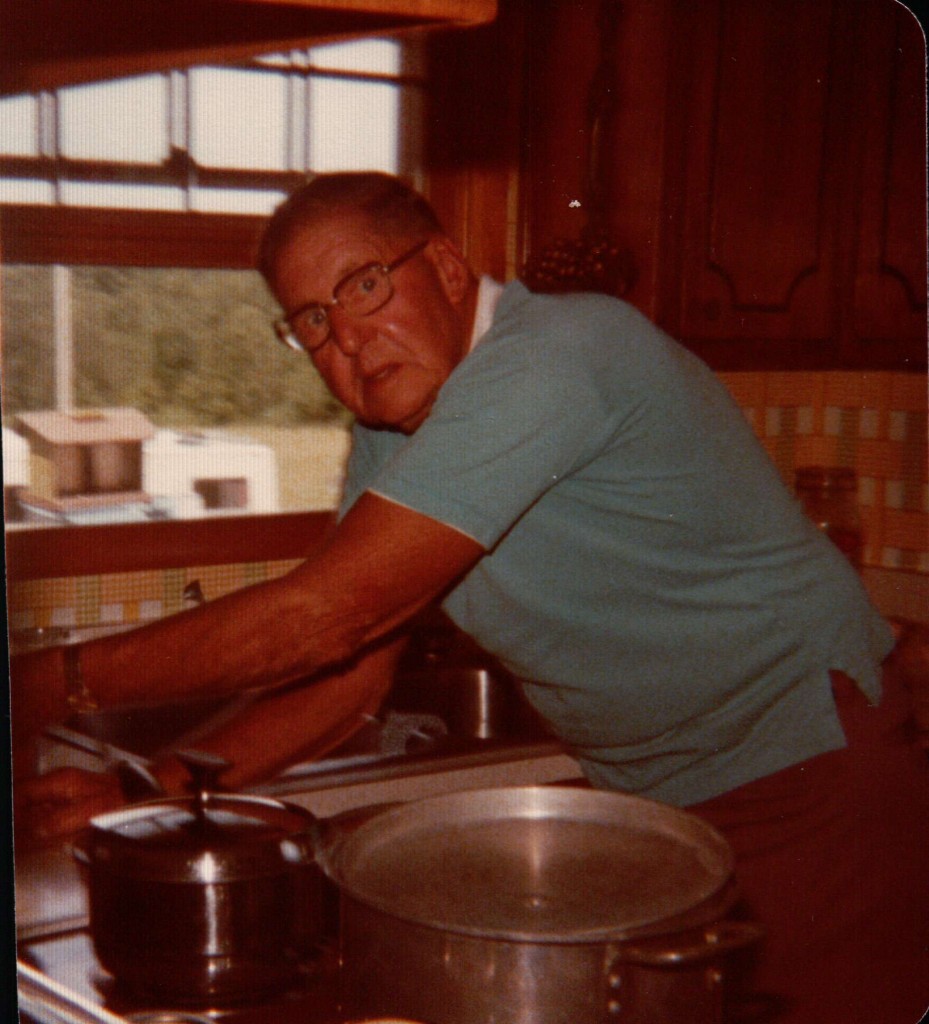
Dad, in his element, the kitchen. This was taken by his sister Iris at our house in Gobles, MI, in 1978. Iris had hid around the corner and jumped out and scared him — thus the look on his face.
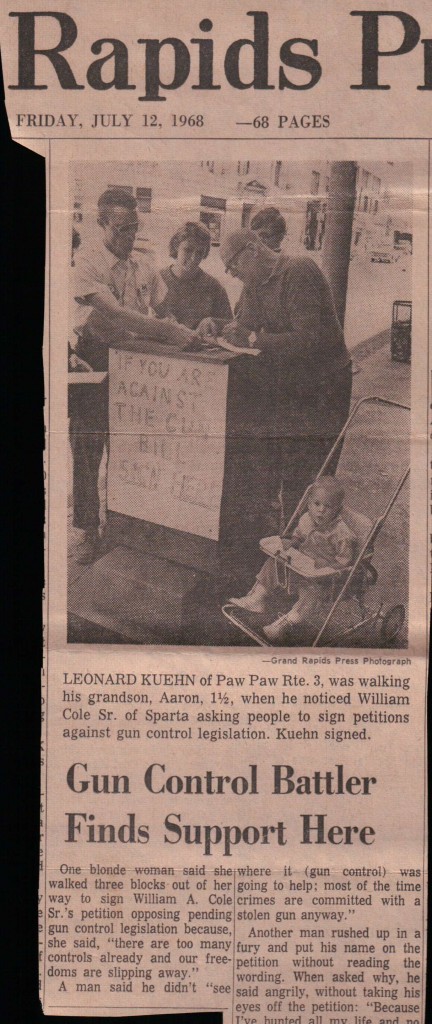
Dad signing a petition against the Gun Control Act of 1968. The Grand Rapids Press didn’t believe he was my father and insisted and crediting me as his “grandson.”
